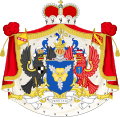
| ||
|---|---|---|
His Serene Highness Otto Eduard Leopold, Prince of Bismarck, Count of Bismarck-Schönhausen, Duke of Lauenburg ContentsEarly career Legacy
| ||
Dropping the Pilot is a political cartoon by Sir John Tenniel, first published in the British magazine Punch on 29 March 1890. [1] It depicts Chancellor Otto von Bismarck as a maritime pilot who is stepping off a ship, perhaps a reference to Plato's ship of state, [1] idly and unconcernedly watched by a young Wilhelm II, German Emperor. Bismarck had resigned as Chancellor at Wilhelm's demand just ten days earlier on 19 March [2] [3] because of political differences.
After the cartoon's publication, Tenniel received a commission from the 5th Earl of Rosebery to create a copy to be sent to Bismarck himself. The former chancellor reportedly replied, "It is indeed a fine one". [4]
The cartoon is well known in Germany and often used in history textbooks and school books, under the title The Pilot Leaves the Ship (German : Der Lotse geht von Bord). [1]




